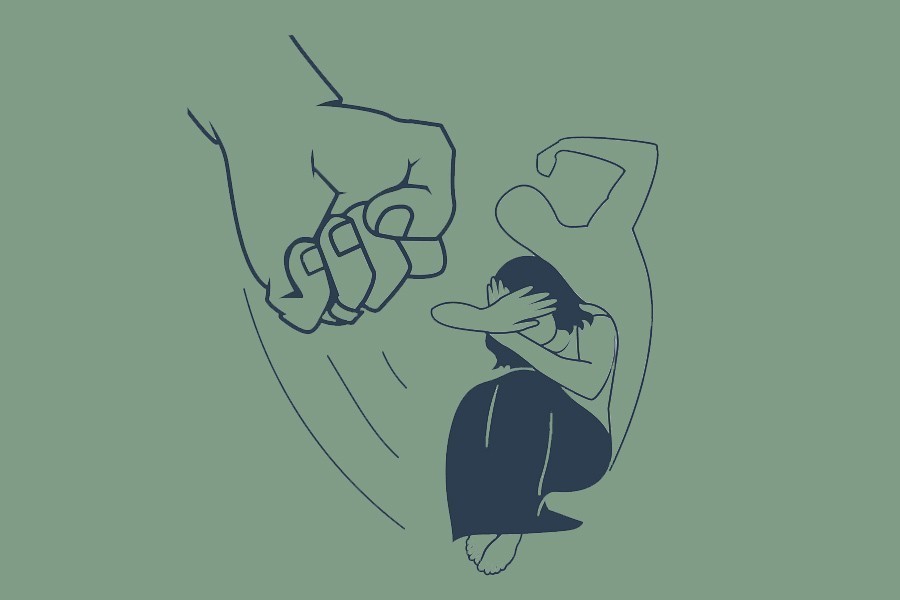
Published :
Updated :

Bangladesh sees a surge in violence against women and girls when it enters the final phase of its national plan to build ‘a society without violence against women and children by 2025’, says Human Rights Watch (HRW).
Particularly, during the Covid-19 pandemic, the domestic violence has increased, a trend, which, according to an HRW report, highlights long-term systemic barriers to legal recourse, protection, and social services.
“‘I Sleep in My Own Deathbed’: Violence against Women and Girls in Bangladesh” is the title of the report, released on Thursday. It interviewed 50 women and also referred to NGO hotlines that confirmed a rise in distressed calls.
The recent incidents of violence reportedly include rape, dowry violence, torture, burning, trafficking and abduction. A BRAC programme documented a nearly 70 per cent increase in reported incidents of violence.
At least 235 women were murdered by their husbands or families of their husbands in nine months of 2020, according to media reports collated by Ain o Salish Kendra.
Widespread protests have broken out in Bangladesh recently after several cases of sexual and physical abuse came to the fore.
“The uptick in violence against women and girls during the Covid-19 pandemic, as well as recent protests against sexual violence, are a bellwether to the Bangladesh government that urgent structural reform is needed,” the HRW’s South Asia director Meenakshi Ganguly said.
She insisted that the government should take concrete action by creating accessible shelters across the country, ensuring access to legal aid, and removing obstacles to reporting violence and obtaining justice.
The New York-based rights group has observed that many domestic abuse survivors literally have nowhere they can go to escape the violence because Bangladesh has too few shelter spaces.
For victims of gender-based violence, it apprehends, continuing to pursue a legal case for years on end might be too dangerous without protection measures or safe shelters.
There are an estimated 21 government-run shelters and 15 NGO-run shelters for survivors of gender-based violence in Bangladesh with over 80 million women. “This is deeply inadequate considering that most women in Bangladesh face some form of violence in their lives,” the HRW report pointed out.
Saying that Bangladeshi women and girls face endemic violence in all facets of their lives, the report quoted a women’s rights lawyer as adding, “Society thinks domestic violence is silly violence, that it’s something that normally just happens in the family.”
Despite some important advances, the HRW found, the government response remains deeply inadequate, barriers to reporting assault or seeking legal recourse are frequently insurmountable, and services for survivors are in short supply.
Of more than 11,000 women who filed legal cases through one of the government’s nine One-Stop Crisis Centres for women and girls, only 160 resulted in conviction – about 1.0 per cent, according to the Multi-Sectoral Programme on Violence Against Women.
“Perpetrators of gender-based violence are rarely held to account in Bangladesh,” says the HRW.
It further mentioned that with a backlog of some 3.7 million cases, trials are often delayed or drawn out for years.
The HRW report has recommended improving access to services for victims of gender-based violence, including by establishing an adequate number shelters accessible to all survivors — at least one in every district — and providing survivors with financial support, housing, legal assistance, support services, counseling, and health and mental health services.
Apart from suggesting strengthening ongoing public awareness campaigns, it emphasised recruiting and retaining more female police officers, prosecutors, and judges.
The HRW also urged the government to consult women’s rights activists and legal experts to draft and enact a law to protect victims and witnesses.
“The Bangladesh justice system is failing women and girls with devastating consequences,” Ganguly said.
She argued that since protesters are calling for change, the government “should seize this pivotal moment to implement real reform that could save lives and promote the equal society it envisions.”
khawaza@gmail.com


 For all latest news, follow The Financial Express Google News channel.
For all latest news, follow The Financial Express Google News channel.